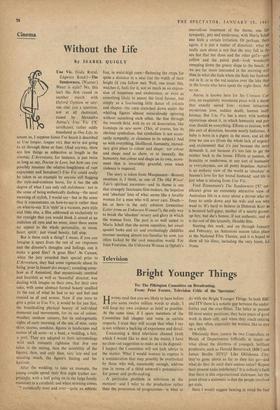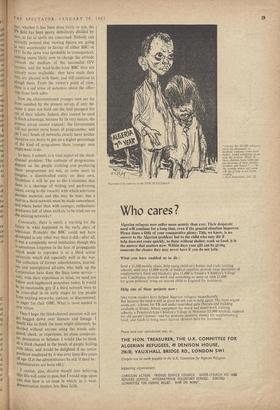Television
Bright Younger Things
To: The Pilkington Committee on Broadcasting.
From: Peter Forster, Television Critic of the 'Spectator.'
HAVtNG read that you are likely to have before you some twelve million words to study, I will keep my own evidence as brief as possible. At the same time, if I spare members of the Committee full chapter and verse in certain respects, I trust they will accept that what I say is not without a backing of experience and detail.
Concerning a third television channel (with which I would like to deal in the main), I have no clear-cut suggestion to make as to its disposal: I suspect the Committee will not lack advice in the matter. What I would venture to express is a consideration that may possibly be overlooked by those who will, reasonably enough, address you in terms of a third network's potentialities for power and profit-making.
A particular problem in television at the moment—and I refer to the production rather than the promotion of programmes—is what to do with the Bright Younger Things. In both BBC and ITV there is a notable gap between the under- forties and the over-fifties. The latter at present fill most senior positions; they have years of good work in them still; and when they reach retiring age, they often, especially the women, like to stay on a while.
Obviously there cannot be two Controllers or Heads of Departments (officially at least)—so what about the dilemma of youngish, brilliant producers, such as Donald Baverstock (BBC) and James Bredin (ITV)? Like Oklahoma City, they've gone about as far as they kin go—and what do they do until their seniors retire? Repeat their present tasks indefinitely? It is nobody's fault that there is this organisational stalemate, but the point about a stalemate is that the people involved get stale.
Next I would suggest bearing in mind the fact that, whether it has been done fairly or not, the TV field has been pretty definitively divided by now, so far as spoils are concerned. Nobody can seriously pretend that viewing figures are going to vary enormously in favour of either BBC or TV. In the same way (probably in consequence), nothing seems likely now to change the attitude towards the medium of the successful ITV tycoons, and the bred-in-the-bone BBC men are scarcely more malleable: they have made their ruts, are pleased with them, and will continue to Plough them. From the viewer's point of view, there is a sad sense of sameness about the offer- ings from both sides.
Now the, aforementioned younger men are far from satisfied by the present set-up, if only be- cause it does not hold out the best prospect for Use of their talents. Indeed, they cannot be used to fresh advantage, because by its very nature, the Present set-up cannot expand : the Government will not permit more hours of programmes, and (as I say) heads of networks clearly have neither incentive nor desire to put on a higher percentage of the kind of programme these younger men might want to do.
So here, 1 submit, is a vital aspect of the third- channel problem. The contents of programmes depend on the people evolving and producing them—programmes are not, as some seem to inlagine, a disembodied entity on their own. Doubtless it will be put to the Committee that there is a shortage of writing and performing talent, owing to the voracity with which television devours material, and this may be true : but a start to a third network must be made somewhere, And where better than with younger, enthusiastic Producers full of ideas unlikely to be tried. out on the existing networks?
Conversely, there is surely a warning for the future in what happened in the early days of television. Probably the BBC could not have developed in any other way than it did—after all, it Was a completely novel institution, though this is sometimes forgotten in the face of propaganda which tends to represent it as a third senior university which did especially well in the war. The collection of former schoolmasters, journal- ists and unemployed all-sorts who built up the Corporation have done the State some service— Only, with their experience in mind, we need not follow such haphazard procedure today. It would he an inestimable city if a third network were to be controlled in its early stages by top people from existing networks, curious, or discontented, or eager for their OBE. What is most needed is new vision.
Thus 1 hope the third-channel question will not get bogged down over licences and lineage. I would like to think the issue might ultimately be decided without anyone using the words safe- guard, check, or experience, let alone comprom- ise, precaution or balance. I would like to think of a third channel in the hands of people boiling With ideas, and would be delighted if no senior Producer employed by it was over forty-five years of age. (Let the administrators be old, if need be : administrators arc born old.) I cannot, alas, deceive myself into believing that this will come to pass, but I would urge upon You that here is an issue in which, as it were, denomination matters less than faith.



































 Previous page
Previous page